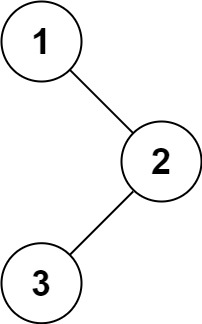LeetCode in Racket
94. Binary Tree Inorder Traversal
Easy
Given the root of a binary tree, return the inorder traversal of its nodes’ values.
Example 1:

Input: root = [1,null,2,3]
Output: [1,3,2]
Example 2:
Input: root = []
Output: []
Example 3:
Input: root = [1]
Output: [1]
Example 4:

Input: root = [1,2]
Output: [2,1]
Example 5:

Input: root = [1,null,2]
Output: [1,2]
Constraints:
- The number of nodes in the tree is in the range
[0, 100]. -100 <= Node.val <= 100
Follow up: Recursive solution is trivial, could you do it iteratively?
Solution
; Definition for a binary tree node.
#|
; val : integer?
; left : (or/c tree-node? #f)
; right : (or/c tree-node? #f)
(struct tree-node
(val left right) #:mutable #:transparent)
; constructor
(define (make-tree-node [val 0])
(tree-node val #f #f))
|#
(define (inorder-traversal tree)
(if (not tree)
'()
(append (inorder-traversal (tree-node-left tree))
(list (tree-node-val tree))
(inorder-traversal (tree-node-right tree)))))

